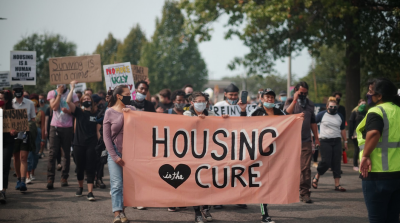Five encampments in St. Paul [Minnesota] are scheduled to be evicted in the coming weeks, two already have been. @STPCampsHub and local activists have organized an event to raise awareness of the states continued brutality.
When: January 3rd at 2pm
Where: 387 Marion St. St. Paul
Context:
In 1956, after failing to provide electricity, modern plumbing, or municipal services to the immigrant community of Swede Hollow, the City of St. Paul declared the Hollow a health hazard, forcibly evicted families, and burned the neighborhood down. On April 16th of this year, a St. Paul city worker neglected to check a tent before removing it with a utility vehicle, seriously injuring the woman inside. And on National Homeless Persons’ Memorial Day, the City of St. Paul displaced residents of the Kellogg encampment from their home and from each other.
This approach is in direct contradiction with CDC Guidelines, which state, in part: “[i]f individual housing options are not available, allow people who are living unsheltered or in encampments to remain where they are. Clearing encampments can cause people to disperse throughout the community and break connections with service providers. This increases the potential for infectious disease spread.” We contend that shelters wherein residents must share restrooms do not qualify as “individual housing options”, whereas hotel rooms do. If there are currently only 385 hotel rooms available, there are not enough “individual housing options” for every person living outside in St. Paul. And evicting an encampment with an active COVID-19 outbreak will only create further spread.
According to the City of St. Paul’s “Coordinated Response to Unsheltered Homelessness During COVID-19”, “encampments represent a serious health and safety risk.” The CDC recommends several methods for mitigating these risks, none of which the City has implemented adequately. These include “work[ing] together with community coalition members to improve sanitation in encampments” and providing functional, well-stocked restroom facilities.
“Quality of life” policing in cities across the country jeopardizes the physical safety, sleep patterns, and mental health of unhoused people. If City ordinances that prohibit “camping” truly aim to reduce the size and presence of the homeless population, then they have been wholly ineffective—recent statistics reflect growing numbers of people experiencing unsheltered homelessness in St. Paul year after year, despite their enforcement. As various City departments continue to expend funds on enforcing and administering these laws in St. Paul, we urge you to instead direct these resources toward proven methods of reducing homelessness. The National Homelessness Law Center published Tent City, USA: The Growth of America’s Homeless Encampments, and How Communities are Responding, which includes best practices, model policies, and case studies from cities across the country responding to encampments.
If we do not provide long-term, permanent indoor housing options at this time, we must at least allow unhoused people to maintain their stable residence outdoors.
We are calling for the City of St. Paul to immediately:
Convene an emergency St. Paul City Council meeting to address these issues
Place a moratorium on enforcement of any illegal camping ordinance, to last the duration of the COVID-19 pandemic
Halt the clearing and disposal of tents and other sheltering materials to ensure that unhoused people do not lose what may be their only present means to self-quarantine and practice social distancing
Adhere to the existing statewide eviction moratorium
Follow best practices outlined by the National Homelessness Law Center

